(825 products available)

















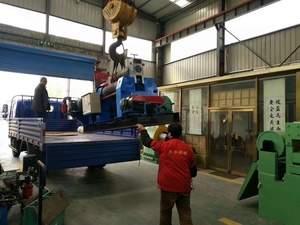


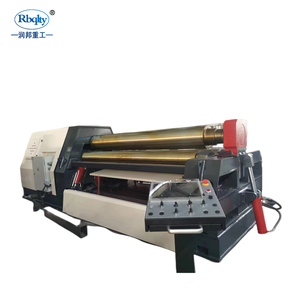
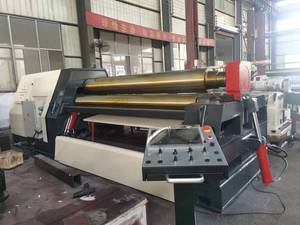



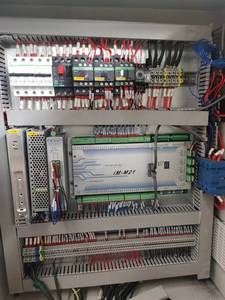


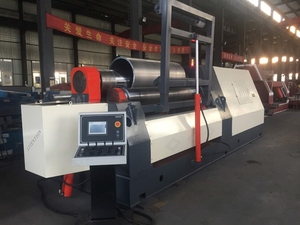



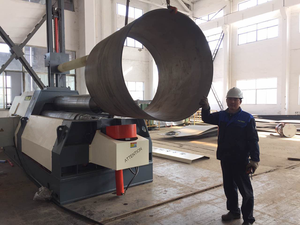






















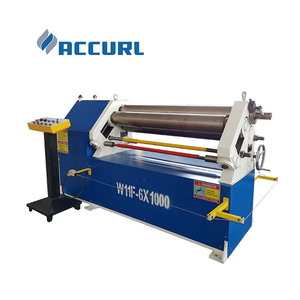
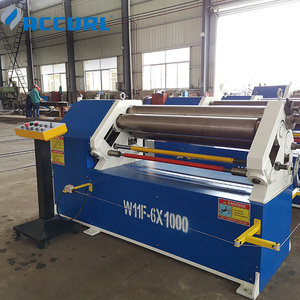

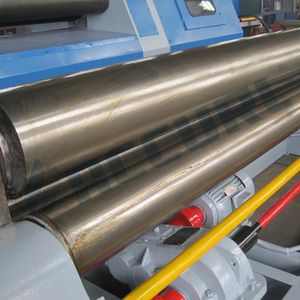










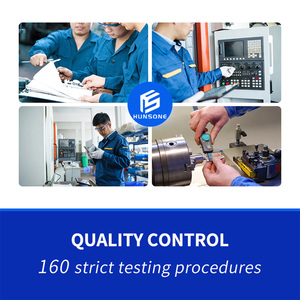




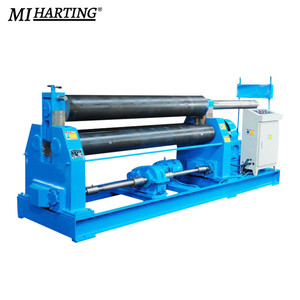

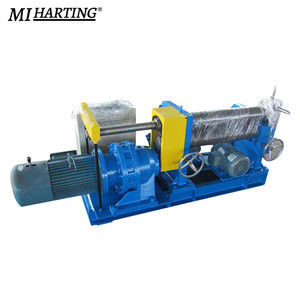








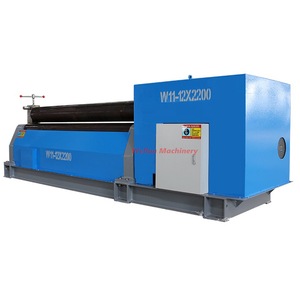




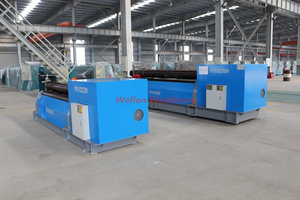








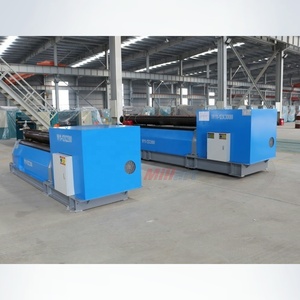





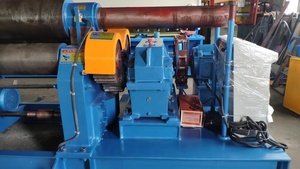



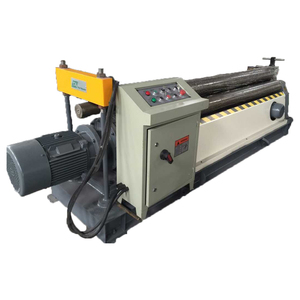
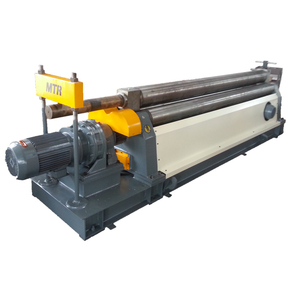
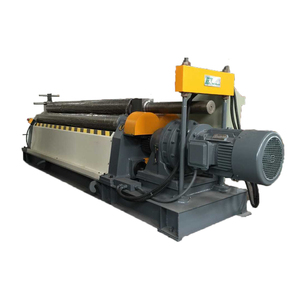







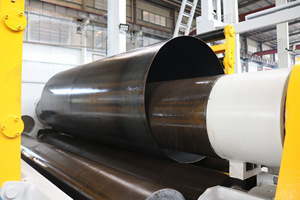








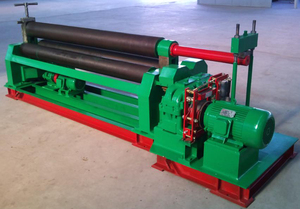
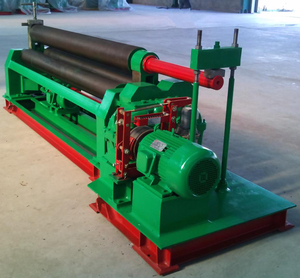






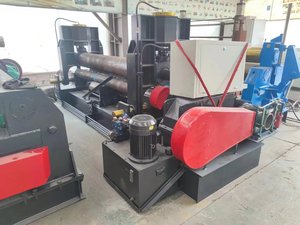












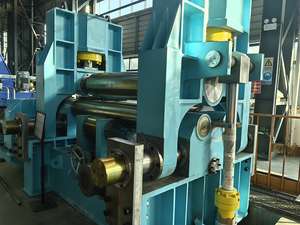






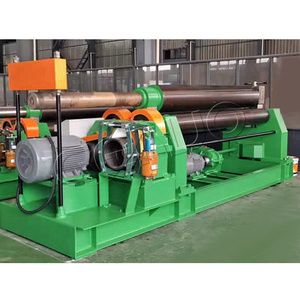
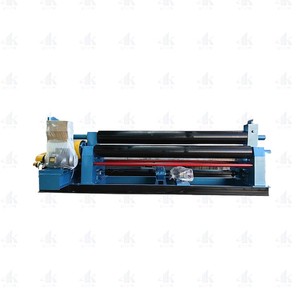



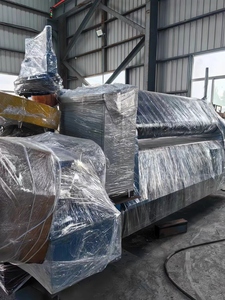




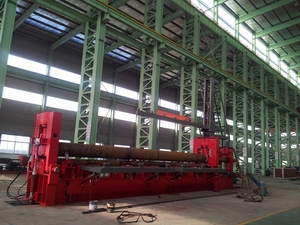

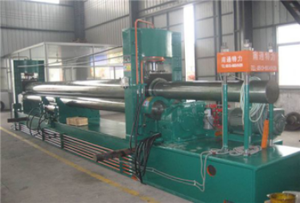

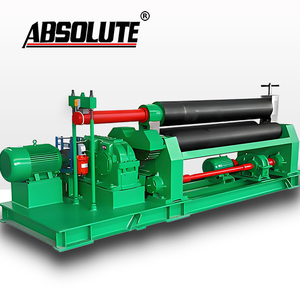

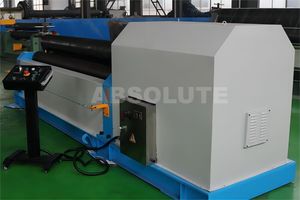
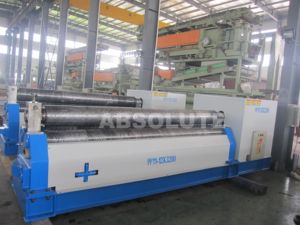
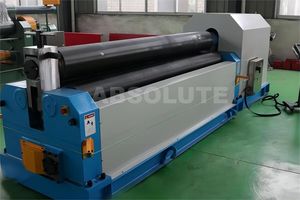

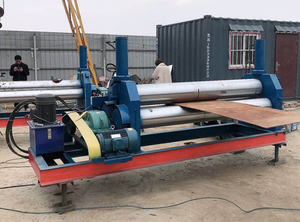






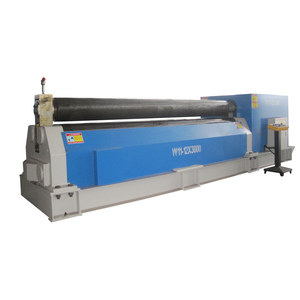

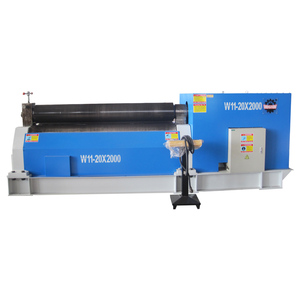







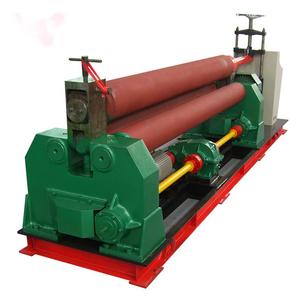
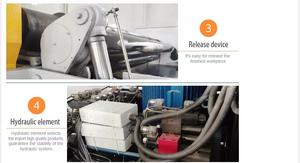





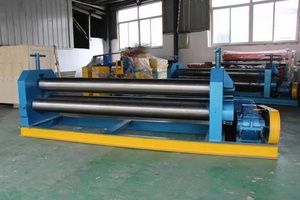


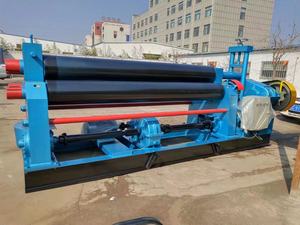
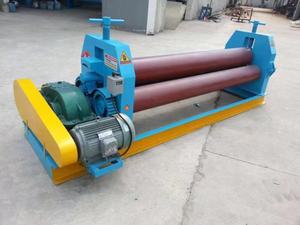



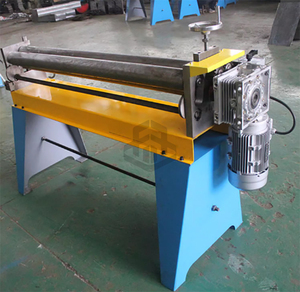








A rollers symmetric rolling machine has many forms. Each is highly useful for various metal rolling tasks. These machines excel at bending and shaping metal sheets, ensuring the final results meet project needs. Here are the types of symmetrical rolling machines available:
Three-Roller Pyramid Rolling Machine
The strong three-roller pyramid design is compact but delivers great power. It has two side rollers and one adjusting roller that shapes the metal into tight curves. People prefer it when limited space and heavy-duty tasks coexist and provide a strong and efficient way to produce cylindrical shapes.
Horizontal Symmetrical Rollers
The two-horizontally placed rollers are simple yet effective. This machine is great for tasks needing wide metal sheets to be rolled into cylinders. With a straightforward setup, it yields even results across broad sheets of metal, and the design is effective for creating consistent large-diameter cylinders.
Vertical Symmetrical Rollers
Vertical symmetrical rollers stand out for their unique setup. It has two vertical rollers that sit side by side. They make this efficient for smaller tasks. Its vertical design is great for producing shorter pipe sections and compact shapes. This machine fits well in smaller workspaces and produces quality work even in limited space.
Dual-Roller Symmetrical Machine
The dual-roller machine uses two identical rollers to create smooth curves. People use it for simple bending tasks and light projects. Its symmetric rollers provide even pressure that ensures consistent results on both sides of the metal. It works well for making gentle bends and is good for light to medium use.
Asymmetric Roller Machine
The asymmetric roller machine has one special part. It has one larger roller and one smaller one that changes its shape. This machine is great for bending metal sheets into various curves. This machine is unique because the size difference between the rollers allows it to create more complex shapes than most bending machines. It fits well for making various curved metal parts.
Choosing the right material for rollers impacts how durable and effective the rolling machine will be over time. Here are the materials and how they relate to the function, durability, and longevity:
Hardening Steel
Hardening steel is often the first choice for rollers. It is used because of its strength and toughness. Rollers resist wear even under heavy use. The steel must go through a hardening process to extend its life. When treating steel, they usually apply heat followed by quick cooling. A hardened steel roller is better able to maintain its shape over time. This is ideal in scenarios where the same roller must work for many hours with little rest.
Chrome-Plated Steel
Chrome plating coats roller surfaces to increase their life. It provides a barrier to moisture and oxidation. This finish helps rollers stay smooth for longer. The chrome also makes the surface less abrasive. Machines often use these rollers in metalwork to avoid rust and corrosion. An example of this is when working with metals like aluminum that can wear down steel quickly.
Rubber Coated Rollers
Rubber rollers offer metal bending flexibility during the shaping process. They give good friction to hold materials in place. Rubber rollers can compress slightly to form rounded shapes without marring the metal's surface. They work well for lighter jobs. They are good when the surface of the metal needs to stay scratch-free or when gentle rolling helps prevent metal thinning.
Cast Iron for Strength
Cast iron is a common choice for making durable rollers. People often choose it for large industrial rolling machines. It delivers solid performance over many uses. The material is resistant to wear, making it last through years of bending and shaping. It produces large parts shaped in molds, so it has a good weight-to-strength ratio.
Alloy Steel
Alloy steels such as chromium-nickel steel are made stronger than regular steel. They can withstand very high and low temperatures, making them versatile for many different jobs. They can also endure more wear and tear over time. These properties translate into a longer-lasting roller that maintains better control. This kind of steel helps the rollers last through a wide range of bending tasks.
The rollers symmetric rolling machine bends and shapes flat metal sheets into round pipes or curves. The machine creates consistent and smooth results.
Preparing The Metal Sheet
Metal sheets must be cut to the correct size based on project needs. If the metal is very thick, users may make a series of passes to bend it fully. A metal sheet that is too thick may need to be rolled slowly or at a low speed. Fast rolling on thick metal could damage the roller surface or machines.
Setting Up The Rollers
The rollers should be positioned based on how tight or loose the curve needs to be. Rolling machines with multiple rollers let users adjust which one to use for different bends. People use end rollers for tight curves and the center one for wider bends. Proper settings ensure even rolling across the metal sheet.
Starting The Rolling Process
The metal sheet goes between the rollers, which begin to turn. As the rollers spin, they pull the sheet into the machine. Front rollers catch the sheet first and guide it in. All rollers then work together to complete the rolling task. The rollers apply pressure to bend the metal into a cylindrical shape. The machines change the shape gradually with each pass to avoid shock to the material.
Making Adjustments If Needed
Users should keep an eye on the results while rolling. If any areas do not bend correctly, the machine settings may need small adjustments. Slight roller pressure changes can fix uneven bends caused by misaligned settings. Proper adjustments ensure the final pipe or curve meets specifications.
Removing The Rolled Metal
Once fully rolled, the bent metal carefully comes out of the machine. Everyone must handle it gently because sharp edges can cut fingers. Inspection should happen immediately after removal to check the quality of the work. Look closely for any missed areas, cracks, or other issues. Catching problems early leads to successful repairs.
Selecting a solid suppliers of rollers symmetric rolling machines is critical for businesses to succeed. Trusted suppliers offer quality machines with good support.
Research Industry Experience
People know suppliers who have worked in the industry for many years get trusted by others over time. Research potential suppliers by looking into how long they have been selling these rolling machines and what kinds of customers they serve. A supplier with experience in this specialized machinery will likely understand how to make and support quality products that will meet the unique needs of businesses in this market.
Compare Product Offerings
It is always helpful to have many options when searching for a machine to buy. When choosing a supplier, one should pay attention to which types of metal rollers they sell. People use some machines for light work while others handle heavy industrial needs. It is easier to find the right fit when having a wide view of their catalog. At the same time, one should be sure their products come from reputable manufacturers who make them to high-quality standards.
Check Quality and Durability
The rolling machine should be examined closely to check its quality and how long it lasts. Good suppliers will have detailed descriptions of their materials and how tough each part is. Online reviews from other businesses can reveal which machines stand up well to frequent use and which do not. Making quality the most important factor will ensure the company invests in reliable tools that do not need replacing after a short time.
Assess Customer Support
A strong customer service policy is vital because those rolling machines need to stay up and running for production schedules to be met. One should ask suppliers what kind of help they provide if there are issues with the machines after purchase. Will replacement parts be available? Are installation instructions easy to follow? Having responsive support when the customers need assistance can make all the difference if an issue arises with using the rolling machine.
Request Quotes and Bulk Pricing
Now is the time to have open and honest discussions with potential suppliers about costs. Since the business will be making large purchases, it helps to request carefully detailed quotes for bulk buying. Being cleared upfront about pricing will preclude any surprises later when the company places orders regularly. Also, knowing all fees avoids hidden charges that impact the budget.
The rollers symmetric rolling machine has many benefits that people like to use for projects that last a long time. Its design makes it useful for creating smooth and precise curves in metal sheets.
Precision Bending
Symmetrical rollers apply even pressure across the metal. This ensures that each bend is exactly the same, no matter where it is on the sheet. This focused and equal pressure leads to highly accurate results. Such tight control over the bending process allows the machine to create complicated shapes and curves that must match exact specifications. This is very important in industries where only very slight variations in shape would cause problems.
Versatile for Various Materials
The machine can work with metals that are thin or thick, soft or hard. Its rollers have the strength and flexibility to bend many different kinds of metal sheets. Whether the material is aluminum, stainless steel, or carbon steel, the symmetrical rollers can handle it. This versatility makes the machine useful for projects across many industries, from construction to manufacturing. It roles metals of various gauges, which is key for creating products of multiple sizes.
Increased Efficiency
The rolling machine is designed to work quickly and accomplish tasks without delay. Its powered rollers spin fast to bend metal sheets promptly. Because it rolls so efficiently, businesses can produce many finished pieces in a short time. This high output meets demands and keeps production costs low, allowing projects to finish on schedule. The machine's speed helps it handle large volumes of work without tiring out.
Heavy-Duty Construction
The machine lasts over many rolls because of its strong build. It holds up to worn metal sheets and rust or damage. The rollers are made from tough materials that do not bend or break after heavy use. Even after rolling many metals, they continue to create precise curves. This durability means the machine will perform for a long time without needing much repair. Users get sustained output without frequent maintenance.
Cost-Effective Maintenance
The rollers symmetrical rolling machine saves money over its lifetime. Its sturdy construction means users spend less repairing parts that wear out. The machine runs for longer without needing replacements or servicing. This durability keeps it productive without many expenses. Fewer repairs and breakdowns save costs and keep the machine working longer. Businesses get more value from the lower maintenance needs.
A1: The rollers symmetrical rolling machine can handle thin and thick metals like aluminum, stainless steel, and carbon steel. Its rollers bend various steel sheets, making it useful in construction and manufacturing.
A2: The symmetrical rollers apply even pressure across the metal sheet. This focused pressure leads to precise, uniform bends that maintain tight control over the bending process, ensuring highly accurate results.
A3: Powered rollers spin quickly, increasing efficiency, especially for large production volumes. The machine pulls the metal sheet through, reducing manual labor and allowing for faster bending.
A4: The rollers are durable, which means users spend less time repairing worn-out parts. Fewer breakdowns and a longer lifespan lead to lower overall maintenance expenses, providing long-term savings.
A5: The rollers are made from hardened steel or alloy materials. These strong rollers prevent bending or wear, and they stand up to repeated bending without losing shape, ensuring consistent performance over time.